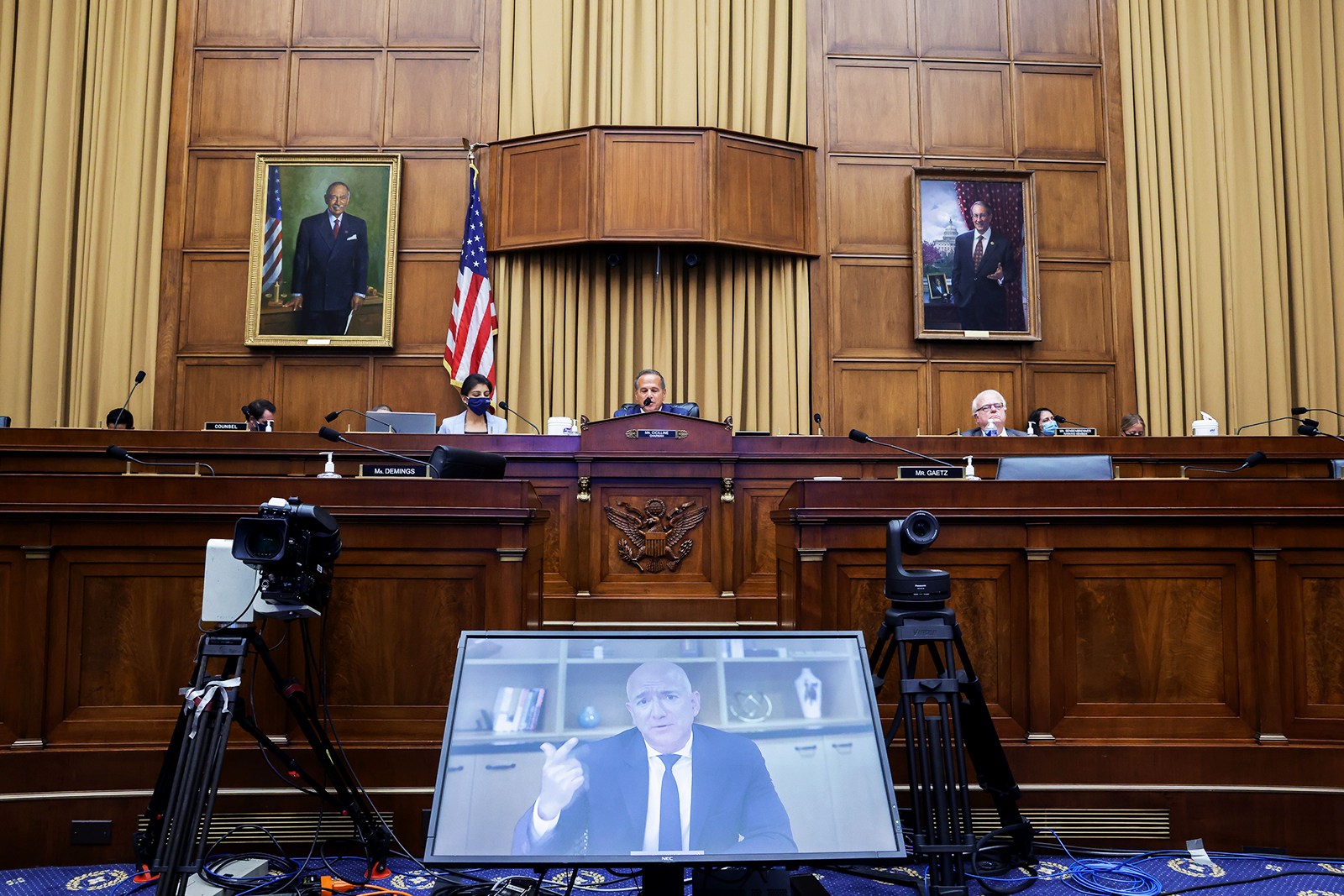Controlling Big Tech: Laws that Ignore Its Business Model Will Fall Short

CEOs of Apple, Facebook, Amazon and Google testify via video conference during the House Judiciary Subcommittee on Antitrust, Commercial and Administrative Law hearing on Online Platforms and Market Power on July 29, 2020, in Washington, D.C.
Photo: Graeme Jennings-Pool/Getty Images
Scholars, legal experts, the media and lawmakers on both sides of the aisle in the United States have serious concerns about the market power of Big Tech, but they are at a loss as to how to frame, measure and get the courts to acknowledge the problem. If bipartisan Congressional leaders are serious about wanting to create new laws to do this, they need to master the underpinnings of the business models the tech giants use.
Big Tech’s Business Model Is Different
Bipartisan Congressional leaders have been working fast on new legislation, yet none of the five bills currently proposed adequately addresses the problem. That is understandable, given the fact that Big Tech companies like Google, Facebook and Amazon all derive their power from business models that generate returns that increase nonlinearly and indefinitely, a feat that was inconceivable before the advent of digital technology.
Appropriate legislation requires an understanding of the intricacies that underpin the creation and high velocity execution of these business models — and in particular, the connectivity of the parts of the business that create a continuous high-speed feedback loop.
Google’s business model, for example, has two cardinal activities: consumer engagement activity (CEA) and advertiser engagement activity (AEA).
These activities continuously reinforce each other at warp speed, while sophisticated tools like deep learning, proprietary algorithms and statistical modeling make refinements as the data flows between them. It is this closed loop connectivity that creates the potential for monopolistic power and anti-competitiveness.
Zero Price to Users
The Congressional sponsors of the bills must understand this connectivity in order to have the correct remedies to curb Google’s power.
Google’s consumer engagement activity has a price of zero to the user. Google will never raise it. So concern about price to the consumer, which Justice Robert Bork focused on, is moot in the Google model. Google gets no monetary revenue from its CEA.
It does, however, get another kind of enormous benefit: “non-monetary revenue” in the form of cumulative data and consumer experience, which is processed at clock speed by deep learning tools to sharpen the effectiveness of advertising on its site. Google can, in turn, increase prices to advertisers for ad space that is more precisely targeted at consumers.
The integration of digital technology in business models must be recognized as a totally new source of power driving toward monopolistic dominance.
Continuous Flow of Data On Consumer Experience
The higher the rate of growth for Google’s advertising revenues, the greater the inflow of cash at an extremely high gross margin. This cash strengthens the company’s already powerful innovation and experimentation engine. It allows Google to outbid others in making acquisitions and to recruit and retain the most advanced talent.
No legacy company can come close to Google’s cumulative data on the consumer experience or to the cumulative learning incorporated in its algorithms via the continuous flow of data and machine learning tools. Only equally powerful business models of equally big tech companies like Amazon can compete effectively with Google.
It is this continuously increasing differential that must be dealt with to stop Big Tech companies from being monopolistic and anticompetitive.
The integration of digital technology in business models must be recognized as a totally new source of power driving toward monopolistic dominance. In the past, the Judiciary claimed monopoly power by defining market shares in absolute percentage terms and judging what number a company could not exceed. Usually, anything greater than 60% market share was considered unacceptable.
None of the HR bills in itself deals with the integration that is the underpinning of a digital company’s market power. Nor do all of them combined.
HR – 3843: The Merger Filing Fee Modernization Act of 2021 would be effective in eliminating moves that would prevent entry of what could be a potential powerful competitor. In the case of Google, its huge market value and cash hoard supported early mega acquisitions and prevented entry by other buyers.
At that time, Google’s business model was in the early stages, and YouTube and dozens of other businesses it acquired could have been compelling competitors. The court erred because it did not understand the underpinnings of Google’s business model or the potential for its growth to escalate. However, the likes of Google will not depend on such acquisitions going forward, unless equally powerful competitors like Amazon or Apple appear on the scene.
HR – 3845: The Ending Platform Monopolies Act depends on government to decide which lines of business a company can and cannot enter, something government has a poor record in doing. The marketplace should and ultimately does decide. This bill will make litigation an ongoing court activity. We know the court failed in the AT&T divestment case to prevent local companies from entering the lines of business they chose.
Other bills tackle data, merger filing fees and conflicts of interest by platform companies. While these bills can be helpful in a small way, they will not stem the trend toward anti-competitiveness.
To understand how to do this, members of congress should seek help beyond legal and political experts. Business leaders and economists can help them to appreciate the underpinnings of this market power so they can translate the necessary fixes into effective laws.






